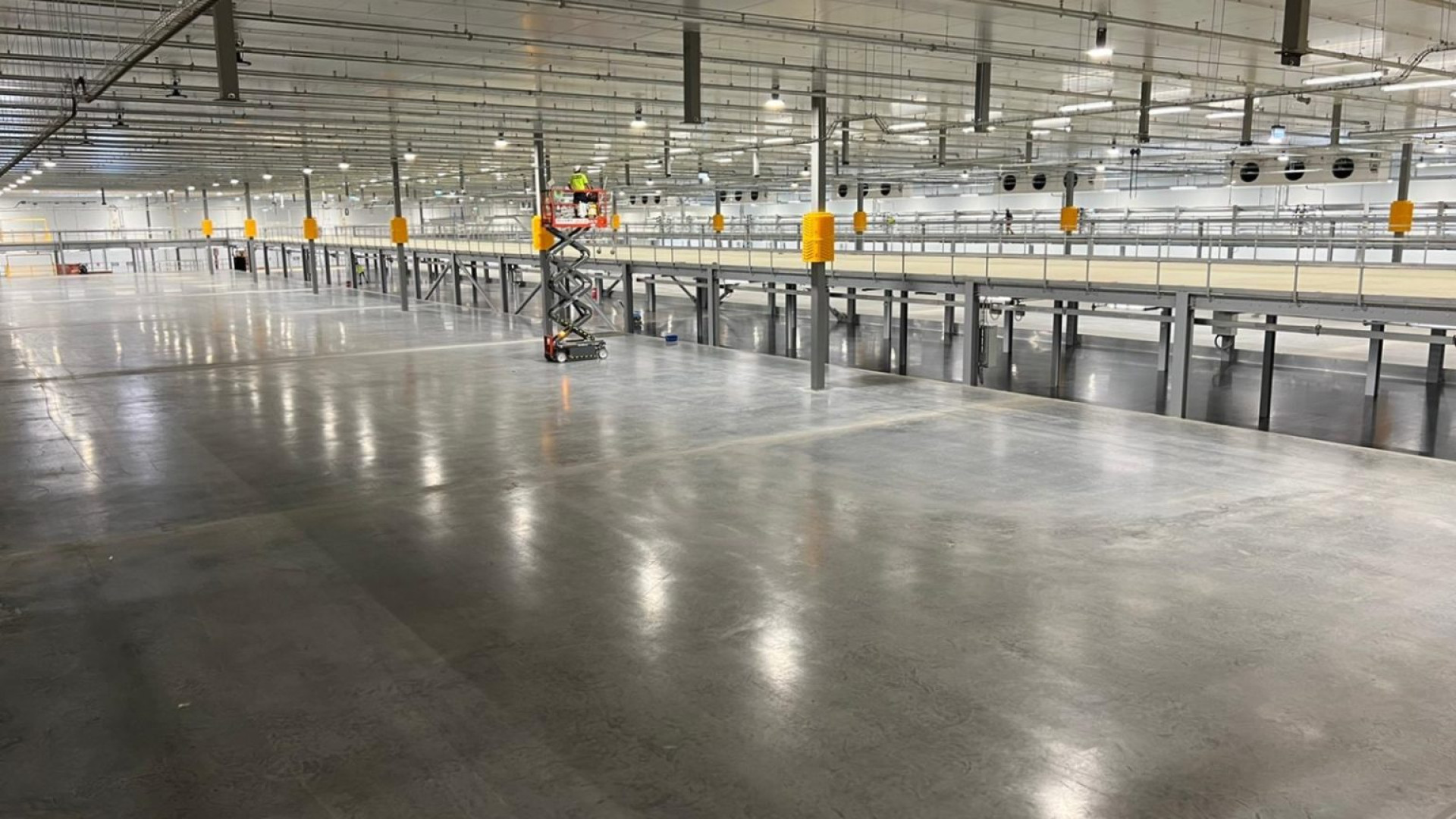When it comes to installing a mezzanine warehouse or industrial space, it’s all too easy to get caught up in more exciting bits – like how much extra space you’ll have, or how it’ll improve your workflow. But, here’s a pro tip: don’t overlook the importance of floor flatness—skipping over this can lead to a multitude of problems.
From the integrity of your mezzanine structure to the safety of your employees, the levelness of your warehouse floor plays a pivotal role. In this piece, we’ll explore why floor flatness and levelness are crucial in mezzanine installation and how they impact operational efficiency, safety, and compliance. Read on to learn more.
Understanding Floor Flatness and Levelness
The terms ‘floor flatness’ and ‘levelness’ are the same concepts, right? Not quite. While these terms sound synonymous, they in fact play unique roles in mezzanine installation. Warehouse floor flatness is all about providing a smooth runway for your forklifts and robotics—it’s what keeps their journey across the floor bump-free and efficient.
Levelness, on the other hand, ensures the floor is parallel to gravity, crucial for the stability of stacked items. Especially in a mezzanine setup, where every inch of vertical space counts, striking the perfect balance between a flat floor for seamless movement and a level one for safety and storage is key to well-oiled warehouse operations.
What is Floor Flatness Testing?
Have you noticed your product racks tilting like the Leaning Tower of Pisa, or your equipment breaking down too soon? An uneven floor might be to blame. Floor flatness testing is the key to determining and solving this issue. It measures the smoothness of a concrete slab, pinpointing any bumps or irregularities that can disrupt operations. This differs from floor levelness, which checks how well the slab aligns with its intended slope.
How is Floor Flatness Measured?
A floor flatness test can evenness and smoothness of the concrete floor, identifying any deviations or irregularities. It’s performed using specialised equipment like a profilograph or laser scanners, which provide precise data on the floor’s condition. Ensuring optimal flatness is essential for the safe operation of machinery and the effective storage of goods on the mezzanine, in turn reducing the risk of accidents and enhancing operational efficiency.
The Importance of Floor Flatness in Mezzanine Installation
The significance of floor flatness in mezzanine installation goes beyond just laying down the foundations. It’s about crafting a safe, efficient, and visually appealing space. Let’s take a look at some of the reasons why this is so crucial:
Structural Integrity and Safety
A warehouse mezzanine needs a level base for rock-solid stability. If the flooring is uneven, it’s like setting the stage for a safety hazard drama. This isn’t just about keeping things upright; it’s about ensuring the entire structure stays safe and sound.
Load Distribution
Mezzanines are the heavy-lifters of warehousing in that they’re engineered to support significant weight. But if the floor underneath is more rollercoaster than a runway, you’re risking a structural nightmare. Think bending, cracking, or even a total collapse under the weight of heavy loads. Proper warehouse floor flatness ensures that weight is distributed evenly, keeping your mezzanine sturdy and reliable.
Alignment and Assembly Challenges
Putting together a mezzanine on an uneven floor is like solving a puzzle with mismatched pieces. Every beam, panel, and bolt counts, and a flat, level base ensures that these components align perfectly. An uneven floor, on the other hand, can turn assembly into an uphill battle, weakening the overall structure.
Operational Efficiency
Amidst the hustle and bustle of your warehouse operations, an uneven floor can be a real speed bump. It can slow down equipment like forklifts and even pose tripping hazards for staff. A smooth, level floor keeps things moving efficiently, ensuring that productivity never hits a dreaded snag.
Compliance with Building Regulations
Australian building codes and standards often have strict guidelines on floor flatness for mezzanines. Adhering to these isn’t just a tick-box exercise; it’s about ensuring the safety and integrity of your structure.
Aesthetics and Usability
Last but not least, a level floor affects how a space looks and feels. Uneven floors can lead to gaps and uneven surfaces, turning your sleek, modern mezzanine into something less appealing. In the world of mezzanines, functionality and style go hand in hand, and a flat floor is key to achieving both.
Solutions: Ensuring Optimal Floor Flatness
Modern Flooring Technologies
Advancements in flooring technologies, like UNILIN panelling, offer superior flatness and levelness compared to traditional concrete floors. These panels require minimal maintenance and provide a consistent finish, enhancing operational efficiency.
Regular Maintenance and Testing
Regular testing and maintenance of warehouse floors ensure ongoing compliance with flatness and levelness standards, preventing long-term issues.
Consult Unistor’s Team of Experts
Find yourself scratching your head before you’ve even begun the mezzanine installation process? Whether you’re sceptical about your floor levelness or unsure about your warehouse floor flatness, our experts at Unistor are here to guide you.
With over thirty years of experience as Australia’s leading manufacturer and supplier of mezzanine flooring solutions, we know the ins and outs of what makes a mezzanine project successful. We offer end-to-end project services from consultation, design, engineering to installation, ensuring you deal directly with the manufacturer—a point of difference that can save you thousands in the long run.
Floor flatness and levelness are not just about aesthetics; they are about safety, efficiency, and compliance. Investing time and resources in ensuring the right foundation for your mezzanine can save costs, enhance safety, and improve operational efficiency in the long run.
Remember, a level floor is the first step towards a stable and efficient workspace. Make sure you have all the necessary information and professional guidance to make it a successful, safe, and cost-effective addition. With Unistor by your side, you’re already a step ahead.
Choose Unistor as the right mezzanine solution and increase your storage capacity by double.


